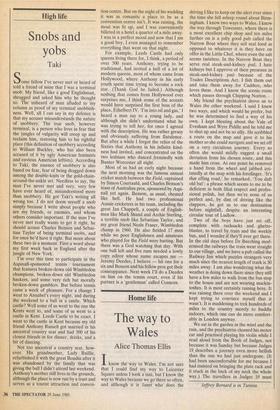High life
Snobs and yobs
Tali
Some fellow I've never met or heard of told a friend of mine that I was a terminal snob. My friend, like a good Englishman, shrugged and asked him why he thought so. The unheard of man alluded to my column as proof of my terminal snobbish- ness. Well, all I can say in my defence is that my accuser misunderstands the nature of snobbery. The true snob, however terminal, is a person who lives in fear that the jungles of vulgarity will creep up and reclaim him, restoring him to his rightful place (this definition of snobbery according to William Buckley, who has also been accused of it by ugly American feminists and envious American leftists). According to Taki, the essence of snobbery is also based on fear, fear of being dragged down among the double-knits or the gold-chain- around-the-ankle set. Needless to say, the man I've never met and very, very few have ever heard of, misunderstood more than snobbery. He got Taki's writing all wrong too. I do not deem myself a snob simply because I write about people who are my friends, or enemies, and whom others consider important. If the man I've never met really wants to get it right, he should accuse Charles Benson and Sebas- tian Taylor of being terminal snobs, and for once he'd have it right. But more about these two in a moment. First a word about my first week back in England after the jungle of New York.
I'm over this time to participate in the Aspinall-sponsored tennis tournament that features broken-down old Wimbledon champions, broken-down old Wimbledon hackers, and some very rich but morally broken-down gamblers. But before tennis came a week of pleasure. For a change I went to Annabel's every night, and during the weekend to a ball in a castle. Which castle? Well some of us went to the one the Kents went to, and some of us went to a castle in Kent. Leeds Castle to be exact. I went to the castle in Kent because my old friend Anthony Russell got married in his ancestral country seat and had 300 of his closest friends in for dinner, drinks, and a bit of dancing.
Not too ancestral a country seat, how- ever. His grandmother, Lady Baillie, refurbished it with the great Boudin after it was abandoned by the family that was giving the ball I didn't attend last weekend.
Anthony's mother still lives in the grounds, although the place is now run by a trust and serves as a tourist attraction and conven- lion centre. But on the night of his wedding it was as romantic a place to be as a convention centre isn't. It was raining, the moat was lit up, and I was conveniently billeted in a hotel a quarter of a mile away, I was in a perfect mood and now that I am a good boy, I even managed to remember everything that went on that night.
For example, Leeds Castle had only queens living there for, I think, a period of over 500 years. Anthony, trying to be traditional, had invited a hell of a lot of modern queens, most of whom came from Hollywood, where Anthony in his early youth spent time trying to become a rock star. (Thank God he failed.) Although nothing that comes from Hollywood ever surprises me, I think some of the accents would have surprised the first boss of the place, Ethelbert IV. 'I'm into oil and gas,' I heard a man say to a young lady, and although she didn't understand what he was trying to tell her, for once I agreed with the description. He was rather greasy and obviously suffering from flatulence. But after a while I forgot the relics of the Sixties that Anthony in his infinite kind- ness had invited, and concentrated on the two lesbians who danced frenziedly with Bunter Worcester all night.
Most of us had an early night because the next morning was the famous annual cricket match between the Field, captained by Simon Courtauld, and Charles Benson's team of Australian pros, sponsored by Aspi- nall yet again. Benson, as usual, cheated like hell. He had two professional Aussie cricketers in his team, including the great Ian Chappell, a couple of English- men like Mark Shand and Archie Sterling, a terrible snob like Sebastian Taylor, and my great friend Neale Fraser, Wimbledon champ in 1960. He also fielded 17 men while we poor Englishmen and amateurs who played for the Field were batting. But there was a God watching that day. With one ball left and five runs needed a lowly copy editor whose name escapes me — Jeremy Deedes, I believe — hit one for a six and Benson and his fellow pros got their comeuppance. Next week I'll do a Deedes on him on the tennis court, even if his partner is a 'gentleman' called Connors.


























































 Previous page
Previous page